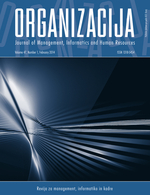Quality registers in professional health care educations; knowledge gaps and proposed actions
Abstract
Background and purpose: The use of quality registers has increased rapidly in Sweden and they are identified as beneficial for health care competitiveness. A quality register is a structured gathering of patient information, to improve health care. However, the introduction of quality registers in health care organisations presupposes that employees know how to use them in quality improvement. Disconnections, or knowledge gaps, concerning quality registers hamper the possibilities to take advantage of them. Taking departure in professional health care educations, the purpose with the paper is to identify and explore knowledge gaps concerning quality registers. A second purpose is to propose actions to bridge the gaps.
Methodology/Approach: In 2012 50 semi-structured telephone interviews were completed and the material analysed in the search for knowledge gaps.
Results: Five knowledge gaps were found. Some professional health care educations teach improvement knowledge, but they have difficulties integrating quality registers as a resource in teaching. Quality registers do not sufficiently cooperate with professional health care educations and county councils do not generally include learning of quality registers in clinical placements/practicums.
Conclusion: Professional health care educations need forums where they can collaborate with others to jointly explore how learning of quality registers can be integrated. There are promising approaches.
Methodology/Approach: In 2012 50 semi-structured telephone interviews were completed and the material analysed in the search for knowledge gaps.
Results: Five knowledge gaps were found. Some professional health care educations teach improvement knowledge, but they have difficulties integrating quality registers as a resource in teaching. Quality registers do not sufficiently cooperate with professional health care educations and county councils do not generally include learning of quality registers in clinical placements/practicums.
Conclusion: Professional health care educations need forums where they can collaborate with others to jointly explore how learning of quality registers can be integrated. There are promising approaches.
Refbacks
- There are currently no refbacks.

